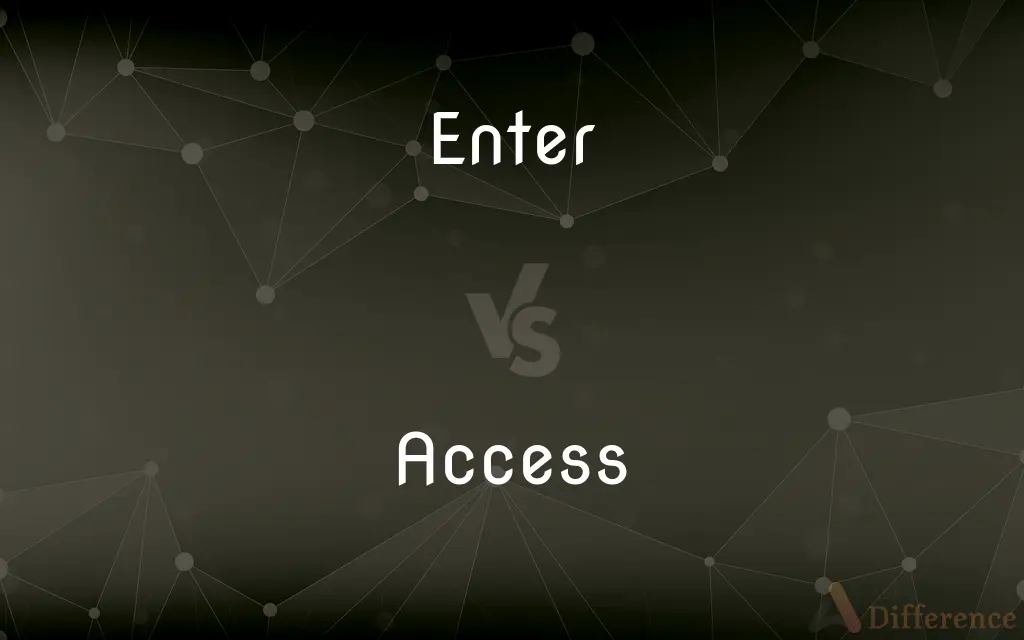Enter vs. Access — What's the Difference?
By Fiza Rafique & Maham Liaqat — Updated on March 20, 2024
"Enter" typically involves physically going into a place or initiating an action, while "access" refers to the ability to use or retrieve information or enter a space, often implying permission or capability.

Difference Between Enter and Access
Table of Contents
ADVERTISEMENT
Key Differences
The term "enter" is primarily used to describe the act of physically moving into a space or starting a particular process. It conveys the action of going inside, such as entering a room, or the act of inputting data into a system, like entering information into a database. On the other hand, "access" involves the ability or permission to approach, enter, or use something. It often relates to gaining entry into digital or restricted spaces, such as accessing a computer system, a file, or a secured area.
When you "enter" something, it implies a physical or active engagement with a space or system. For example, entering a password involves actively typing it into a login field. Whereas "accessing" something usually implies a broader capability or permission that includes both the physical act of entering and the subsequent use or exploration of what has been entered, such as accessing the features of a software application after entering (typing in) the password.
In many contexts, "enter" can be used without implying permission; you can enter a public park freely. However, "access" inherently carries the notion of having the right or privilege to make use of something. Accessing a members-only website requires specific credentials, underscoring the need for authorization.
"Access" is often used in contexts where the focus is on the retrieval or utilization of information or services. Gaining access to data, for instance, emphasizes the ability to retrieve and use that data, not just the act of entering the data into a system. On the flip side, "entering" data highlights the initial act of input or engagement rather than the ongoing ability to use or retrieve it later.
While "enter" is about the commencement or physical movement into a space, "access" extends to the concept of ongoing availability or use. Accessing a building doesn't just mean you can enter; it suggests you can also use its facilities, whereas entering a building focuses on the act of crossing its threshold.
ADVERTISEMENT
Comparison Chart
Definition
To physically go into a place or initiate an action.
The ability to use or retrieve information, or the permission to enter a space.
Contexts
Physical spaces, data entry, starting processes.
Digital systems, information retrieval, secured areas.
Implication
Physical movement or initiation of action.
Permission, capability, or right to use or retrieve.
Focus
The act of entering or starting.
The ability or permission to use, retrieve, or enter.
Examples
Entering a room, entering data into a form.
Accessing a computer system, accessing files.
Compare with Definitions
Enter
To go into a place.
She entered the room quietly.
Access
To retrieve information.
Access your account details online.
Enter
To start or initiate.
Enter your details to register.
Access
To have the right to use something.
Members can access the gym anytime.
Enter
To begin participation.
They entered the competition last minute.
Access
To open or use.
Access the file from the main menu.
Enter
To come into consideration.
The idea never entered my mind.
Access
To gain entry to a place or system.
Access the building using your ID card.
Enter
To input data.
Enter the code to unlock the feature.
Access
To connect to a service.
Access the internet via the network.
Enter
To come or go into
The train entered the tunnel.
Access
A means of approaching, entering, exiting, communicating with, or making use of
A store with easy access.
Enter
To penetrate; pierce
The bullet entered the victim's skull.
Access
The ability or right to approach, enter, exit, communicate with, or make use of
Has access to the restricted area.
Has access to classified material.
Enter
To introduce; insert
She entered the probe into the patient's artery.
Access
Public access.
Enter
To become a participant, member, or part of; join
Too old to enter the army.
Entered the discussion at a crucial moment.
Access
An increase by addition.
Enter
To gain admission to (a school, for example).
Access
An outburst or onset
An access of rage.
Enter
To cause to become a participant, member, or part of; enroll
Entered the children in private school.
Entered dahlias in a flower show.
Access
To obtain access to, especially by computer
Used a browser to access a website.
Accessed her bank account online.
Enter
To embark on; begin
With Sputnik, the Soviet Union entered the space age.
Access
(uncountable) A way or means of approaching or entering; an entrance; a passage.
Enter
To make a beginning in; take up
Entered medicine.
Access
(uncountable) The act of approaching or entering; an advance.
Enter
To write or put in
Entered our names in the guest book.
Enters the data into the computer.
Access
(uncountable) The right or ability of approaching or entering; admittance; admission; accessibility.
Enter
To place formally on record; submit
Enter a plea of not guilty.
Enter a complaint.
Access
(uncountable) The quality of being easy to approach or enter.
Enter
To go to or occupy in order to claim possession of (land).
Access
An increase by addition; accession
An access of territory
Enter
To report (a ship or cargo) to customs.
Access
(countable) An onset, attack, or fit of disease; an ague fit.
Enter
To come or go in; make an entry
As the president entered, the band played "Hail to the Chief.".
Access
(countable) An outburst of an emotion; a paroxysm; a fit of passion.
Enter
To effect penetration.
Access
The right of a noncustodial parent to visit their child.
Enter
To become a member or participant.
Access
The process of locating data in memory.
Enter
A key on a keyboard or keypad used to enter or confirm a command or other textual input.
Access
Connection to or communication with a computer program or to the Internet.
Enter
(intransitive) To go or come into an enclosed or partially enclosed space.
You should knock before you enter, unless you want to see me naked.
Access
Or assent.
Enter
(transitive) To cause to go (into), or to be received (into); to put in; to insert; to cause to be admitted.
To enter a knife into a piece of wood;
To enter a boy at college, a horse for a race, etc.
Access
(transitive) To gain or obtain access to.
Enter
(figuratively) To go or come into (a state or profession).
My twelve-year-old son will be entering his teens next year.
She had planned to enter the legal profession.
Access
To have access to (data).
I can't access most of the data on the computer without a password.
Enter
(transitive) To type (something) into a computer; to input.
Enter your user name and password.
Access
A coming to, or near approach; admittance; admission; accessibility; as, to gain access to a prince.
I did repel his letters, and deniedHis access to me.
Enter
(transitive) To record (something) in an account, ledger, etc.
Access
The means, place, or way by which a thing may be approached; passage way; as, the access is by a neck of land.
Enter
To become a party to an agreement, treaty, etc.
Access
Increase by something added; addition; as, an access of territory. [In this sense accession is more generally used.]
I, from the influence of thy looks, receiveAccess in every virtue.
Enter
To become effective; to come into effect.
Access
An onset, attack, or fit of disease.
The first access looked like an apoplexy.
Enter
(legal) To go into or upon, as lands, and take actual possession of them.
Access
A paroxysm; a fit of passion; an outburst; as, an access of fury.
Enter
To place in regular form before the court, usually in writing; to put upon record in proper from and order
To enter a writ, appearance, rule, or judgment
Access
The right to enter
Enter
To make report of (a vessel or its cargo) at the custom house; to submit a statement of (imported goods), with the original invoices, to the proper customs officer for estimating the duties. See entry.
Access
The right to obtain or make use of or take advantage of something (as services or membership)
Enter
To file, or register with the land office, the required particulars concerning (a quantity of public land) in order to entitle a person to a right of preemption.
Access
A way of entering or leaving;
He took a wrong turn on the access to the bridge
Enter
To deposit for copyright the title or description of (a book, picture, map, etc.).
Entered according to act of Congress
Access
(computer science) the operation of reading or writing stored information
Enter
To initiate; to introduce favourably.
Access
The act of approaching or entering;
He gained access to the building
Enter
(computing) Enter
Access
Obtain or retrieve from a storage device; as of information on a computer
Enter
(computing) Enter
Access
Reach or gain access to;
How does one access the attic in this house?
I cannot get to the T.V. antenna, even if I climb on the roof
Enter
To come or go into; to pass into the interior of; to pass within the outer cover or shell of; to penetrate; to pierce; as, to enter a house, a closet, a country, a door, etc.; the river enters the sea.
That darksome cave they enter.
I, . . . with the multitude of my redeemed,Shall enter heaven, long absent.
Enter
To unite in; to join; to be admitted to; to become a member of; as, to enter an association, a college, an army.
Enter
To engage in; to become occupied with; as, to enter the legal profession, the book trade, etc.
Enter
To pass within the limits of; to attain; to begin; to commence upon; as, to enter one's teens, a new era, a new dispensation.
Enter
To cause to go (into), or to be received (into); to put in; to insert; to cause to be admitted; as, to enter a knife into a piece of wood, a wedge into a log; to enter a boy at college, a horse for a race, etc.
Enter
To inscribe; to enroll; to record; as, to enter a name, or a date, in a book, or a book in a catalogue; to enter the particulars of a sale in an account, a manifest of a ship or of merchandise at the customhouse.
Enter
To go into or upon, as lands, and take actual possession of them.
Enter
To make report of (a vessel or her cargo) at the customhouse; to submit a statement of (imported goods), with the original invoices, to the proper officer of the customs for estimating the duties. See Entry, 4.
Enter
To file or inscribe upon the records of the land office the required particulars concerning (a quantity of public land) in order to entitle a person to a right pf preëmption.
Enter
To deposit for copyright the title or description of (a book, picture, map, etc.); as, "entered according to act of Congress."
Enter
To initiate; to introduce favorably.
Enter
To go or come in; - often with in used pleonastically; also, to begin; to take the first steps.
No evil thing approach nor enter in.
Truth is fallen in the street, and equity can not enter.
For we which have believed do enter into rest.
Enter
To get admission; to introduce one's self; to penetrate; to form or constitute a part; to become a partaker or participant; to share; to engage; - usually with into; sometimes with on or upon; as, a ball enters into the body; water enters into a ship; he enters into the plan; to enter into a quarrel; a merchant enters into partnership with some one; to enter upon another's land; the boy enters on his tenth year; to enter upon a task; lead enters into the composition of pewter.
Enter
To penetrate mentally; to consider attentively; - with into.
He is particularly pleased with . . . Sallust for his entering into internal principles of action.
Enter
To come or go into;
The boat entered an area of shallow marshes
Enter
Become a participant; be involved in;
Enter a race
Enter an agreement
Enter a drug treatment program
Enter negotiations
Enter
Register formally as a participant or member;
The party recruited many new members
Enter
Be or play a part of or in;
Elections figure prominently in every government program
How do the elections figure in the current pattern of internal politics?
Enter
Make a record of; set down in permanent form
Enter
Come on stage
Enter
Put or introduce into something;
Insert a picture into the text
Enter
Take on duties or office;
Accede to the throne
Enter
Set out on (an enterprise, subject of study, etc.);
She embarked upon a new career
Common Curiosities
Can "enter" imply unauthorized entry?
Yes, "enter" can be used regardless of whether permission has been granted, including instances of unauthorized entry, whereas "access" typically suggests legitimacy or permission.
Can "enter" and "access" be used interchangeably?
While they can be similar in some contexts, their specific implications about physical movement versus permission and capability usually distinguish their appropriate usage.
Does "entering" a website imply the same as "accessing" it?
"Entering" a website might imply simply visiting or starting to use it, while "accessing" a website suggests the ability to use its features or obtain information from it, often requiring specific credentials.
What does it mean to "enter into" an agreement?
"Entering into" an agreement involves actively committing or signing up for a contractual relationship. It emphasizes the action of agreeing to the terms and conditions laid out.
Is "access" always physical?
No, "access" is not always physical. It can refer to the ability to obtain or retrieve information, services, or use software, which does not necessarily involve a physical component.
How does "access" imply permission?
"Access" often entails having the right or authority to use or enter something, which implies that permission has been granted by someone with the authority to do so.
How is "access" used in the context of disabilities?
In the context of disabilities, "access" refers to the modifications or accommodations made to ensure that individuals with disabilities have the ability to enter, use, or benefit from a facility, service, or information, similar to individuals without disabilities.
Is "access" only related to digital spaces?
No, "access" can apply to physical spaces (like buildings) and services, not just digital or virtual systems, although it is commonly used in the latter.
Can "enter" refer to starting a state or condition?
Yes, "enter" can be used to describe the initiation of a state or condition, such as "entering a state of tranquility" or "the country entered a period of prosperity."
How does the concept of "access" apply in online education?
In online education, "access" refers to the ability of students and educators to connect with and use educational platforms, resources, and materials. It emphasizes the importance of availability and usability of online learning tools for effective education.
Share Your Discovery

Previous Comparison
Him vs. He
Next Comparison
Perspire vs. SweatAuthor Spotlight
Written by
Fiza RafiqueFiza Rafique is a skilled content writer at AskDifference.com, where she meticulously refines and enhances written pieces. Drawing from her vast editorial expertise, Fiza ensures clarity, accuracy, and precision in every article. Passionate about language, she continually seeks to elevate the quality of content for readers worldwide.
Co-written by
Maham Liaqat















































